My Neighbour Totoro’s Mei Mac on the queer magic of Studio Ghibli and her ‘fight’ for representation
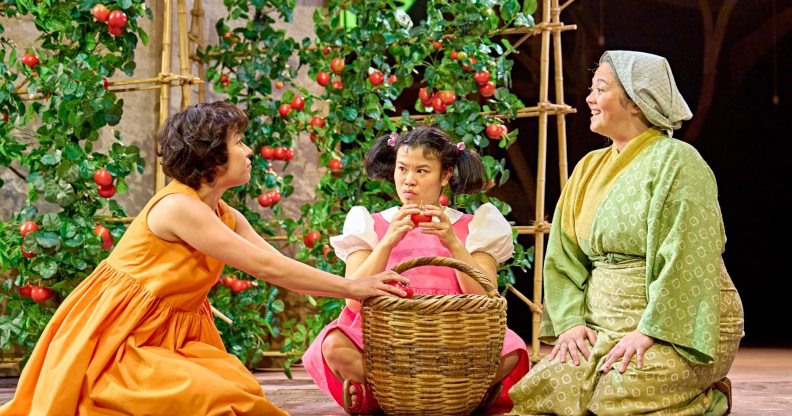
Ami Okumura Jones as Satsuki (left), Mei Mac as Mei and Jaqueline Tate as Granny (right) in My Neighbour Totoro. (Manuel Harlan/RSC/ Nippon TV)
Ami Okumura Jones as Satsuki (left), Mei Mac as Mei and Jaqueline Tate as Granny (right) in My Neighbour Totoro. (Manuel Harlan/RSC/ Nippon TV)
A new stage adaptation of the Studio Ghibli classic My Neighbour Totoro is the show of the season. Lead actor Mei Mac talks bringing the story to life and the changing world of theatre.
Mac plays Mei Kusakabe – a four-year-old who, along with her sister, is grieving their ill mother in post-war Japan. As they come to terms with their circumstances, they soon find hope in the forests around their home that are full of magical beings, including the beloved character Totoro.
The RSC production brings a fresh take to the 1988 animated Studio Ghibli classic and, for Mac, an openly queer East Asian Actor, is a testament to how far the industry has come over the past decade.
“The show is about loving nature and tapping into humanity,” Mac tells PinkNews. “It’s reminding yourself of that childlike wonder which everyone has before you get really bogged down in adult issues. You remember the root of what it is to be human, what it is to wonder about the world, what it is to fall in love with nature.”
Amid rave reviews and sold-out shows, PinkNews spoke to Mac about her push for representation, the magi of Ghibli, and the joy of working with “so many Gaysians”.
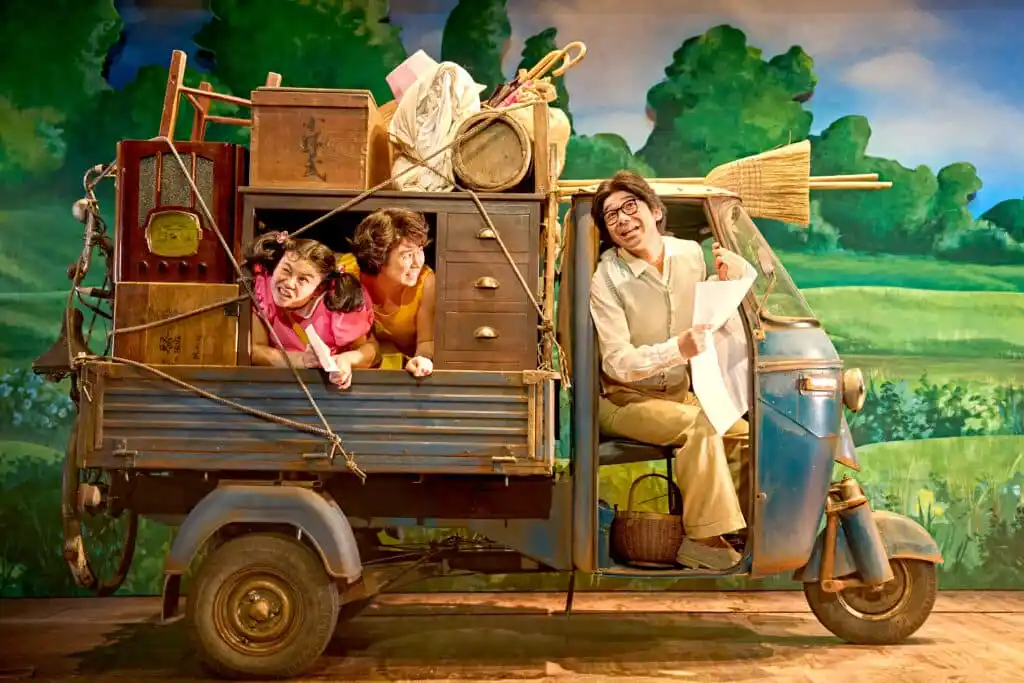
Mei Mac as Mei (left), Ami Okumura Jones as Satsuki and Dai Tabuchi as Tatsuo (right). (Manuel Harlan/RSC/Nippon TV)
Did you grow up with Studio Ghibli?
I grew up with Ghibli in the same way lots of kids grew up with Disney, which I’m really grateful for. In my line of work, I’m really interested in what it means to decolonise storytelling and decolonise art. And the thing about Asian and Ghibli storytelling is that there aren’t often good guys and bad guys. It’s not a binary sense of morality.
Do you have a favourite film?
Princess Mononoke. I actually did the stage adaptation for it as my very first job in 2012. That’s my favourite Ghibli film because [the character] Lady Eboshi is very easily painted as the bad character because she’s doing bad things to nature and to the forest. But you learn very quickly that she’s doing it to save other human beings.
It’s just people trying to do their best with the resources that they have. It opens your imagination up for empathy. And that’s ultimately what art is.
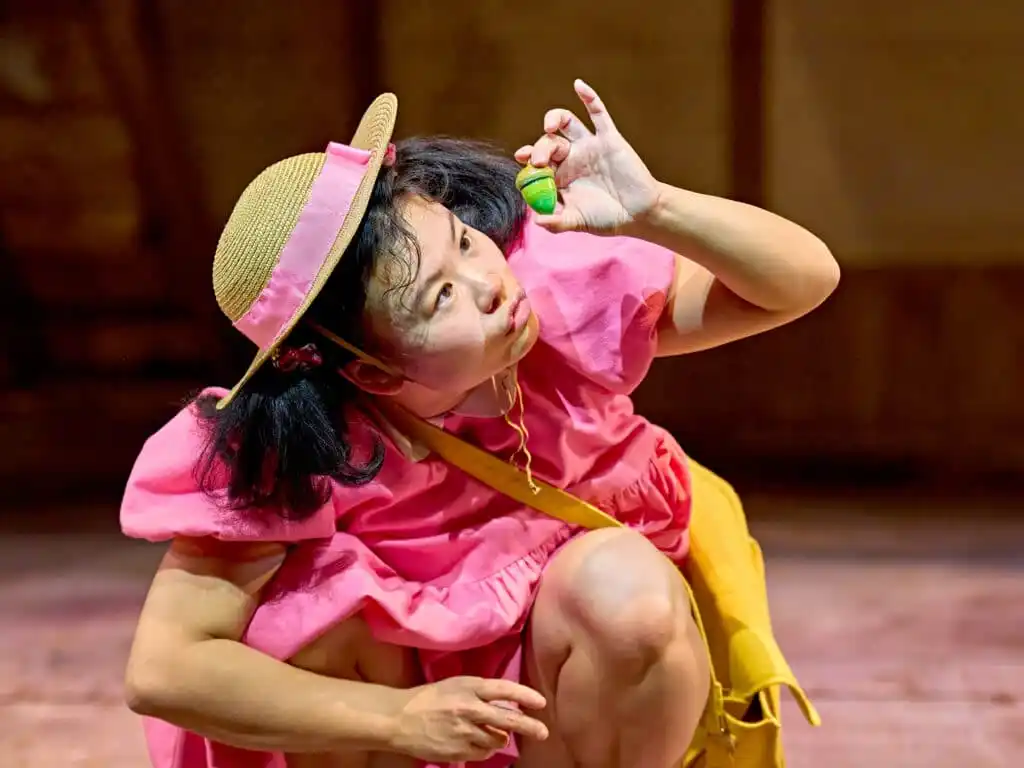
Mei Mac as Mei. (Manuel Harlan/RSC/Nippon TV)
The first Studio Ghibli film I ever watched was Spirited Away and it completely captured me. You see found family, boundless imagination and this idea of accepting yourself – which has huge parallels to the queer experience.
Absolutely. It’s such a gorgeous parallel to draw. And I think that is true. It’s so glorious to work in a company of so many East Asians and Southeast Asians. I do feel like we’re doing it right. And there are so many Gaysians! I’ve never worked with so many Gaysians and it’s so wonderful.
The thing about chosen family is that when you bond and meet over something that connects you all, you think, ‘yes, these are the people who get me’. It means you don’t have to constantly explain what you’re going through.
Ghibli is really good at showing and allowing us to fall in love with the idea of community. And as a queer adult when you’re looking for your chosen family, community is ultimately what you’re looking for.
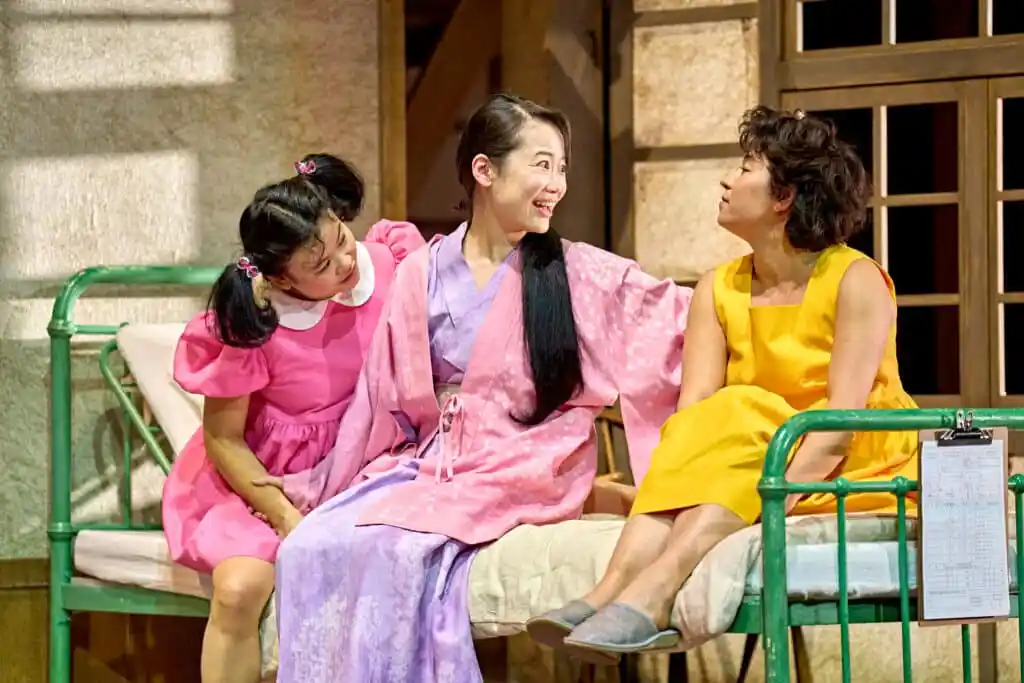
Mei Mac (left), Haruka Abe as Yasuko and Ami Okumura Jones (right). (Manuel Harlan/RSC/Nippon TV)
How much has the theatre industry changed when it comes to East and Southeast Asian representation over the decade you’ve been working in it?
It’s changed massively. When I first started 11 years ago, it felt like a desert. There was very, very little out there for anyone who looks like me. Over the years a lot of my career has been about campaigning for better representation.
We never exist in a vacuum, I stand on the shoulders of giants who have done this activist work before me. And my aim is to make my shoulders broad enough so that activists after me can stand on my shoulders. We keep moving forwards in this way and holding each other up.
In the past five years, I think the change has been extraordinary and that has been no small feat. It has come with huge amounts of work from the community and my contribution to that is Rising Waves. We connect emerging [British East and Southeast Asian] artists with established artists.
And when it comes to queer representation?
I feel like there was a long time where white gay men dominated queer storylines. And that was just the representation we had of queerness. Now I feel like everyone’s got really excited about lesbian storylines. And soon we’ll have pansexual storylines, and bisexual storylines, and trans storylines. More people are stepping up for authentic storytelling and gatekeepers are being more generous about what stories they let you tell.
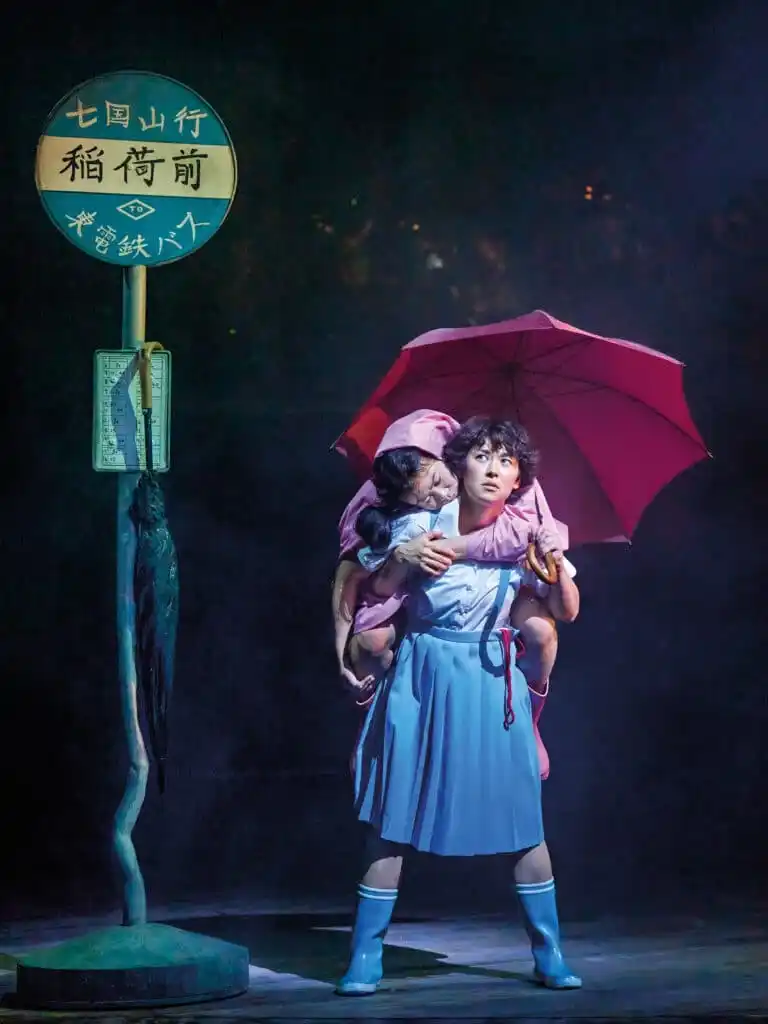
Ami Okumura Jones and Mei Mac in My Neighbour Totoro. (Manuel Harlan/RSC/Nippon TV)
Is there any queer theatre that has impacted you recently?
I didn’t get to see it because of clashing schedules, but I, Joan by Charlie Josephine was top of my list. Charlie is one of the voices of our generation. I feel like Charlie came into the Globe ready to disrupt this institutionalised space. It was gorgeous watching them collaborate on work that is so unapologetically queer.
Unfortunately the backlash to I, Joan also proved there is still a long way to go as well…
I would love the world to be changing at the pace that we often see in our industry. But we have so much work to do and have to bring people along for the ride. We have to keep fighting for simple rights. None of us are free until we’re all free.
I also want to mention Tabby Lamb’s play Happy Meal [a joyful queer rom-com following a millenial and Gen Z], which happened at the Edinburgh Fringe. The fight has to happen across the scale. In major institutions but also where new work is being created all the time.
Does the positive reaction to My Neighbour Totoro give you hope?
I am absolutely blown away, because I’m so glad that people love it as much as we do. It feels like we have poured our hearts and souls into making this play. It’s not just from the Asians in the room, but it’s all of the allies who fought so damn hard for us to do this.
We want to serve the dream of Totoro. The dream of loving nature, the dream of loving humanity, the dream of celebrating the mundane of simply existing, coupled with the extraordinary of having these magical forests.
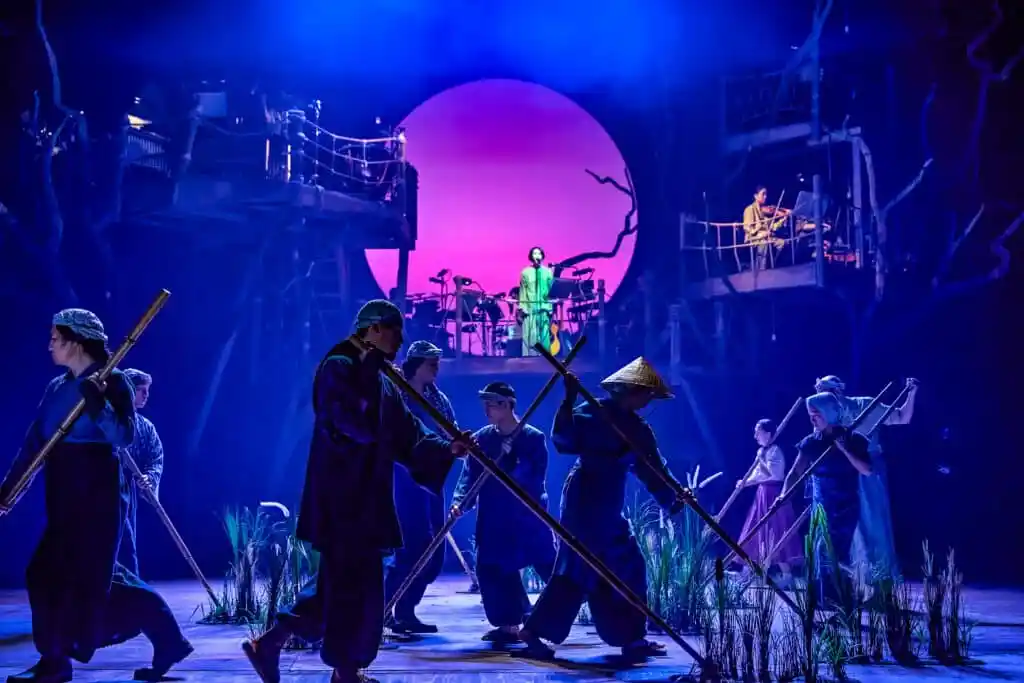
Ai Ninomiya and members of the My Neighbour Totoro company. (Manuel Harlan/RSC/Nippon TV)
How does the stage adaptation differ to the film?
From day one, we said that we wanted to honour the essence of the film but ultimately, our stage production is going to be a completely different experience. It is the one thing that live theatre can do that no other art medium can do. Give that sense of seeing something in front of your eyes that only you will see, because tomorrow night, it’s gonna be totally different.
There’s some really fantastic stage magic and stage craft. Watching humans perform things that are seemingly impossible is a wonder in and of itself, because it takes so much talent and creativity and imagination.
We deliver moments that our audiences are going to recognise and love. But then give it a twist, a moment where they realise this isn’t the animation. This is in real life.
And what message do you want the audience to take away?
That grief and pain can exist alongside the feeling of hope. When the children plant seeds in the garden for their sick mother they don’t grow to begin with, but from that grief grows these incredible trees. And that for me represents hope.
And secondly, your ability to empathise with almost anyone or anything is infinite.
During Pride Month I did a talk on puppetry. I asked someone in the audience to scrunch up a piece of paper and then I breathed life into it. For about two minutes the audience fell in love and believed that it was alive.
Then I killed it. And the audience hated me. I told them that if they can fall in love with this piece of paper so much in the space of two minutes, then that love can extend to any other human being on the planet.
My Neighbour Totoro is running in the Barbican until 21 January, 2023. Tickets are available here.
This article contains affiliate links, PinkNews may earn revenue if you click through and purchase products through the links.

